I am not sure I have much to add to the current debate raging through the lines of communication of the cyber-world right now regarding the recent amendment to Church guidelines that was recently released. In this new amendment, children in practicing LGBT households would not be able to receive a ‘name and a blessing’ as infants, baptism at the age of eight, receive the priesthood at the age of 12, or participate in temple or missionary work until the age of 18. I have not had to give up my husband because he has same-sex attraction, or any of the other scenarios that might arise from this type of circumstance. But I do know what it is like to have my family torn apart because of the choices of another family member.
And because of that, I feel that I might, just might, be able to understand to a small degree this situation.
THREAD ONE
Where do I begin?! There are so many angles this story is taking right now in the LDS social community that I could start just about anywhere. But the thread that is really tugging at my heart-strings is this one:
“Why should the children be punished because of the choices of their parents?!”
It’s true. Why should the children be “punished” for the sins of their fathers or mothers?
In fact, isn’t there some sort of mantra in our religions that firmly states that?
“We believe that man will be punished for their own sins,
and not for Adam’s transgressions.”
(The 2nd Article of Faith)
Alright, so how do we reconcile this Article of Faith with what the Church has recently stated as policy?
Here is how I see it.
Nowhere does the Church state that a blessing, baptism, or other ordinances are being revoked from children for good. In fact, over and over again in his interview regarding this policy change, Elder D. Todd Christofferson’s refers to a child’s majority. Majority, in terms of age, means the age of adulthood as recognized by the state. In America, that is defined as 18 years old. In Canada, that would be 21 years old.
When the child is able to make adult decisions on his or her own, then these children can make the decision to join the Church or not.
Nowhere in the Church does it say that if you are not baptized by the age of eight, than you cannot be a member, or participate in Church worship or practices. If such were the case, there would be no need for missionaries or temples. Missionary work and temple work is specifically designed to offer the gospel to those who might not have had a chance to hear it or accept it by the age of 8.
I believe that, recently, the culture of the Church is overtaking the reason for the Church. Giving your child a name and a blessing is designed to put the Child on the records of the Church. It is not about the pageantry and fashion show that usually accompanies such an event. Baptism at the age of eight should be a decision made by the child and not an opportunity to roll out professionally designed announcements and coordinated white outfits for photo-shoots. Receiving the priesthood at the age of 12 is a responsibility that a boy should understand, and not another badge of achievement.
 And so forth, with all the other expectations that comes with being a member of the Church of Jesus Christ of Latter-day Saints.
And so forth, with all the other expectations that comes with being a member of the Church of Jesus Christ of Latter-day Saints.
Let me be perfectly and honestly clear and bold with you right at this moment. These are individual undertakings for our children and have nothing to do with parents. Our children should be able to make these decisions when they are ready to make them and not because it is culturally expected of them.
THEIR. OWN.
Just as we are not judged for Adam’s sins, our children have the right to choose for themselves right and wrong. As parents, our job is to teach them right from wrong, and then guide them. We should not be choosing for them.
In light of that, I made the decision to ask my oldest how he felt about baptism and if he wanted to take that step when he was 8. It scared me to give him that choice. It was in that moment when I made my own decision that I realized that he was not mine–that he was his own. It hit me very very hard that all I could do was present him with my own testimony and offer him guidance in making the decision. I decided right then and there that whatever his choice was, I would stand by it.
That did not stop me from getting on my knees and praying like mad for guidance and the companionship of the Spirit. By golly, I prayed my little heart out like nothing else in the world mattered.
In the end, I did receive guidance that was perfectly tailored to help that son make his choice. And he did choose baptism. And I felt so much peace inside because I knew without a shadow of a doubt that he had made his choice on his own.
PEER PRESSURE
The community I grew up in, as I have stated before, was predominantly LDS. As you can imagine, come the summer months, young men were lining up to go off on missions. (My time was well before the lowering of the missionary age for eligible young women, I should add). It was almost a competition to see how many people would come to the farewell and how many girls an elder could convince to write to him on his way out the door.
Having grown up with many of these kids, it was almost like clockwork to watch this all play out under the social and cultural pressure of their parents. In their youth, many young men were involved in things that as members of the Church, we preach abstinence from. But as the age of 19 soon approached, the fear of disappointing their parents and appearing as a social outcast reared it’s powerful head and the young men either shaped up, or hid it very well.
Well do I remember sending friends off on their missions, only to see them back at the movie theater a few weeks or months later.
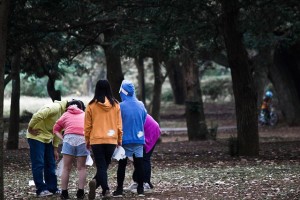 I will admit, I am a little uncomfortable sharing this part of Church culture because it does sound a little judgmental. But the point that I am trying to make here is that sometimes culture plays too strong a role with the youth of the Church and the decisions that they make. Decisions that should be made individually and through study and prayer. And not because of peer pressure or fear of letting our parents down.
I will admit, I am a little uncomfortable sharing this part of Church culture because it does sound a little judgmental. But the point that I am trying to make here is that sometimes culture plays too strong a role with the youth of the Church and the decisions that they make. Decisions that should be made individually and through study and prayer. And not because of peer pressure or fear of letting our parents down.
That is the opportunity that I feel is being offered to children of LGBT communities. No one is being turned away. No one is being told to choose a side. Every one of them is being given a chance to make the decisions for themselves at a time in life when society recognizes an individual as an adult–cultural and social pressures pushed aside.
Because let’s get real for a moment–how many members of your ward do you ignore that are converts? Do you even know when each person was baptized?
If that was the case, I guess I would be disowning my mother right about now.
THREAD TWO
And that brings me to the second argument that keeps sticking out to me like a sore thumb.
“My choices should not affect my children!”
Here is where I feel my life experience helps me to understand this situation.
When my birth father chose to leave his family and start again, his choice was not made because he did not like his children. I have been assured of that from multiple sources–counselors, books, television, magazines, and yes, my very own father.
However, just because his choice was not directly associated with me– YES, IT DOES AFFECT ME.
I have had to live with the consequences of his choice ever since he made his first step away from us.
He was punished for his own sins, but we also suffered consequences.
We had to live with the shame, the ridicule, and the knowledge that everyone in our small LDS community knew that our dad chose another family over his own. In fact, many people told my mother it was her fault. In the end, we moved away and started our life all over again. My mom went back to school and we went on welfare.
All because of a choice someone else made.
My mom didn’t make that choice. My brothers and I didn’t make that choice. It was thrust upon us.
That is life.
THE STORIES WE TELL OURSELVES
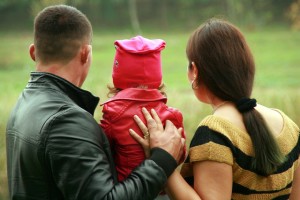 Everyone who makes a decision, whether it be good or bad, has to go through a rationalization process before deciding to make it. We tell ourselves all kinds of stories–true or false–that eventually lead to the final outcome. After the decision is made, you cannot take it back because it has already set in motion a series of events that quickly moves beyond your reach.
Everyone who makes a decision, whether it be good or bad, has to go through a rationalization process before deciding to make it. We tell ourselves all kinds of stories–true or false–that eventually lead to the final outcome. After the decision is made, you cannot take it back because it has already set in motion a series of events that quickly moves beyond your reach.
We can tell ourselves whatever we like, in order to feel justified, but it cannot take away the results of our choice.
Years later, my dad and I have mended our fences. Initially, as a child, the choice to include him in my life was made for me by someone else. And then I continued on with that choice because my husband said it was best for our children. After another period of time, I made the choice for me.
I made the choice because I realized that I was the only one responsible for my actions moving forward.
THREAD THREE
On to the last point that keeps rearing it’s boisterous head.
“What about those families that didn’t choose this for themselves?”
Alright, I get it. As a mother myself, and a child of divorce, I know just how harsh this policy amendment sounds. Mothers who have had their family first torn apart by divorce, and then have to deal with Same Sex step-parenting are in a completely different ball game.
Those mothers did not choose this, and probably wouldn’t have in a million years.
It does seem like this has been thrust upon them unfairly.
But I would like to drag up another example from my family that illustrates this point as well.
I love my step-family, and I am so grateful for them. However, they would not be my step-family if not for one rather unfortunate reason–their mother died of cancer many years ago.
Sickness is not something that is a choice. It is not something that someone can accidentally fall into. Just ask any family that has had a loved one die. They did not see it coming and it was not in their life plan. But it happened.
And it happens all the time.
It is unfair. And there are consequences that range from financial to emotional, and they all leave the survivors behind, devastated.
SCRIPTURE POWER
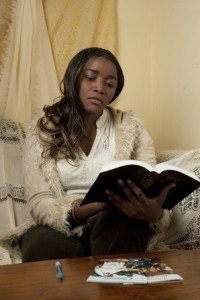 Last week, as I scrolled through my Facebook feed and discovered the news of the amended Church policy, I will admit to feeling a pit forming in my stomach. I wondered what on Earth and in Heaven was going on. I prayed about it that night and hit my pillow feeling ill.
Last week, as I scrolled through my Facebook feed and discovered the news of the amended Church policy, I will admit to feeling a pit forming in my stomach. I wondered what on Earth and in Heaven was going on. I prayed about it that night and hit my pillow feeling ill.
When I woke up in the morning, I felt the same, but I also felt a prompting to read my scriptures, and more specifically–to turn to Jacob in the Book of Mormon and the read his words to the people of Nephi.
And as I read, I felt a peace and understanding come over me.
At a point in time that was not long after Lehi and his family arrived in their Promised Land, and shortly after Nephi himself had died, Jacob feels strongly the burden of speaking to his people as a voice from God. In chapter two in the book of Jacob, he gathers all his people together to share with them the words that their Father in Heaven wanted them to hear. Let me warn you, these words are not easy and Jacob himself says:
“It burdeneth my soul that I should be constrained, because of the strict commandment which I have received from God, to admonish you according to your crimes, to enlarge the wounds of those who have already been wounded, instead of consoling and healing their wounds…”
(Jacob 2:9)
This brings tears to my eyes as I read this in light of current affairs.
“Wherefore, I must tell you the truth according to the plainness of the word of God…”
(Jacob 2: 11)
Among other things, Jacob comes out boldly against the practice that has begun to creep into the lives of the Nephites. We read about husbands taking upon them concubines and practicing whoredoms that they justify because of the kings of old–David and Solomon.
Pretty much, anything that is not part of God’s traditional definition of marriage.
“Wherefore my brethren, hear me, and hearken unto the word of the Lord: For there shall not any man among you have save it be one wife; and concubines he shall have none;”
(Jacob 2: 27)
And here is what really got to me…
“For I, the Lord God, delight in the chastity of women…
I, the Lord, have seen the sorrow, and heard the mourning of the daughters of my people…because of the wickedness and abominations of their husbands…
And I will not suffer…that the cries of the fair daughters of this people…shall come up unto me against the men of my people…
For they shall not lead away captive the daughters of my people because of their tenderness, save I shall visit them with a sore curse…”
(Jacob 2: 28-31)
Families are a big deal to Heavenly Father. He makes no bones about it right here in this chapter. These are words that Jacob shares specifically that Heavenly Father spoke to him and bade him share with his fellow members of the church. Read the words for yourself. Pray over them and decide if they are true.
In the end of this chapter, Jacob speaks directly to the idea that you can make your own choice, but you cannot choose your consequences. He tells the men of his congregation that they have committed even greater sin than the Lamanites because:
“Ye have broken the hearts of your tender wives, and lost the confidences of your children, because of your bad examples before them; and the sobbings of their hearts ascend up to God against you.”
(Jacob 2: 35)
I am letting that sink in.
IN THE END
This Church policy is not about limiting anyone’s actions in the Church. It is not about denying the gospel to anyone. It is about protecting families and removing any ambiguous doubts that people might have regarding the Church’s stance on marriage and family.
It is about allowing people to have their agency–all people. People who choose to have alternative lifestyles, and those whose lives are directly affected by that choice.
The 2nd Article of Faith has it right. Man will be punished for his own sins, and not for (his father’s) transgressions. This is a verse about agency and the right to choose for ourselves what path we follow, whether it be God’s or one of our own making. However, we are not free from the consequences of that choice, nor can we choose who those consequences affect.
“And because of the strictness of the word of God…
many hearts died, pierced with deep wounds.”
(Jacob 2: 35)
About Jessica Clark
Jessica Clark is a wife, mom, writer, runner, knitter, and proud Canadian. She graduated from Brigham Young University with a degree in Anthropology, and has been a student of people and cultures ever since. Right now she is busy studying the behavior and cultures of the people of Texas.
Twitter •

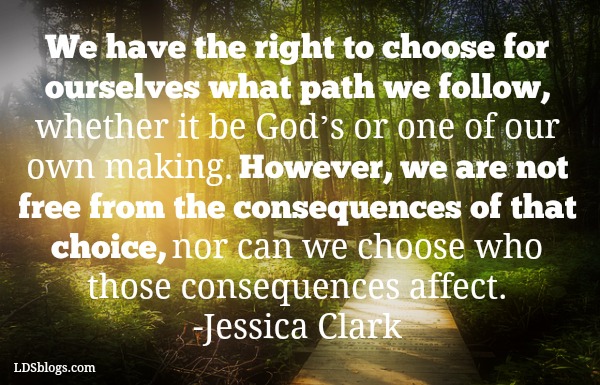
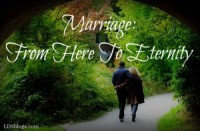
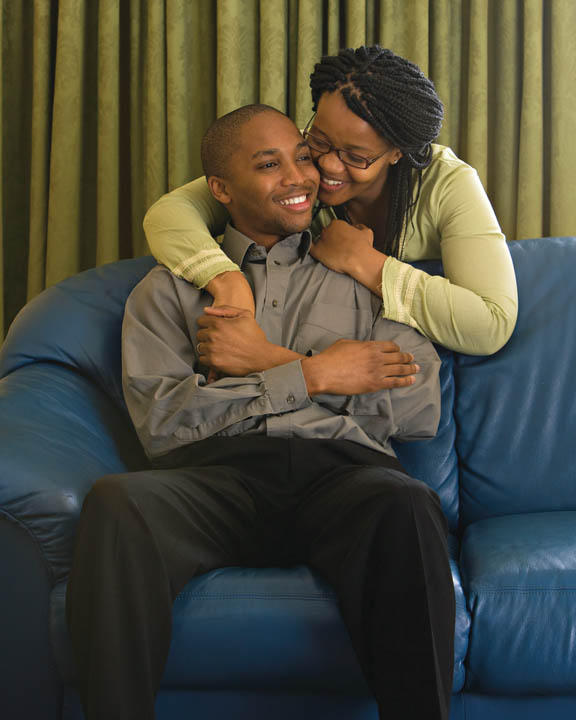
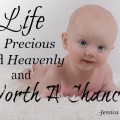

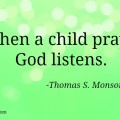

This is a *fantastic* article Jessica. Thank you.